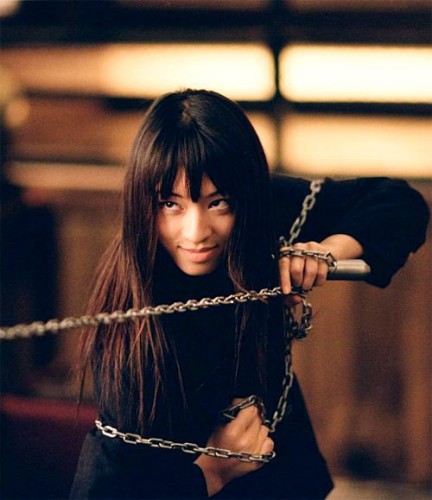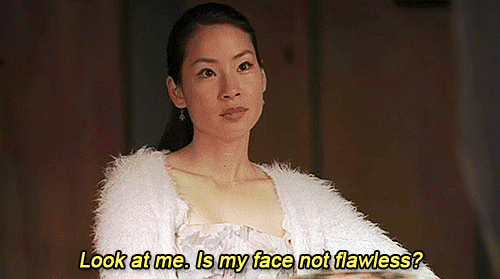
This guest post by Katie Li appears as part of our theme week on Asian Womanhood in Pop Culture.
“So, do you know kung fu?”
This question is the scourge of Asian-America. The assumption that we all know martial arts is one of the handful of stereotypes that pop culture has been mainlining to the masses, leaving individuals to challenge these overly-simplified notions of Asian identity: the China Doll, the Dragon Lady, the Laundry Man, the Kung Fu Hero. We’ve been fighting against these stereotypes for decades—and Hollywood isn’t helping.
This question—like all stereotypes—is born out of unchallenged ignorance. As frustrating as it is for this assumption to be made, I understand how someone could believe that it is real. Fresh Off the Boat is the first show in 20 years to feature an Asian-American family; before that, Margaret Cho was trying to prove that she was an “All American Girl” on her sitcom that was wrought with Asian stereotypes.
In the decades between these two shows, Asian actors have been cast in some movies—but when have Asians in Hollywood held a leading role in a film other than an action movie? The only one I can think of is Harold and Kumar. We have been the perpetual sidekicks, rarely the stars. Lucy Liu, introduced to us in her role as Dragon-Lady-Gone-Lawyer in Ally McBeal hasn’t strayed far from this first impression, constantly portraying the alluring-exotic-sometimes-lethal love interest, never the hero of her own story, never someone a wider audience can identify with as they travel on an emotional journey together.
When we are the leads, we are featured in action movies, doing slick martial arts. The story doesn’t get any more complex or meaningful than getting out of a tricky situation using some kung fu. Since kung fu movies became popular in the 1970s, audiences have sat in dark theaters, absorbing these same images with nothing left to challenge these notions other than people who aren’t too weary of this microaggressor to answer, “No, I don’t know kung fu, and neither do all Asians.”

But what do you do when you actually fit those stereotypes that you must fight against?
I am an Asian-American woman of Chinese and Irish descent. I was a straight-A, piano-playing overachiever in high school. My grandfather was a laundry man and my grandmother owned a restaurant. I grew up doing kung fu.
My parents were my teachers. I didn’t get sugary cereal and cartoons on Saturday mornings–I was at their school, practicing kung fu. A common backdrop of my childhood was basically a Rocky training montage, people red-faced and sweating, doing drills to improve their skills.
The school would do street performances, impressing crowds of tourists in Fanieul Hall with fighting sets and animal-inspired techniques that they had only ever seen in movies. I watched my parents and their troupe as they flew through the air, doing butterfly and hurricane kicks, sometimes whipping weapons under their legs as they took flight. I clapped when the audience clapped, but I had also seen these routines practiced countless times before the show. Even at a young age, I understood that these skills weren’t just magically bestowed or gained in a montage. They required hard work and sacrifice.
My everyday life was a behind-the-scenes look at the kung fu movies that left everyone so impressed. Many of my parents’ students were actually super heroes—stunt doubles for movies like Mortal Combat, Batman, and Power Rangers. I watched these movies at home and understood that those characters were real people—people I knew. I understood that there was a difference between the action portrayed in films, and real stories in our lives.
The majority of my parents’ students were not in movies, they were just regular people looking for a new way to work out and feel good about themselves. They were young and old, college students and professionals of many different racial and cultural backgrounds. Kung fu wasn’t something that was just for Asians. But that’s not what the media would have us believe.
When people ask me, “Do you know kung fu?”
I can actually answer, “Yes.”
Being able to affirm someone’s stereotype isn’t a proud or happy moment. I stopped expecting people to shut up, satisfied with knowing that they met an Asian who did kung fu. Instead, I am met with more questions, microaggressors that are just as presumptuous and ignorant as assuming someone of Asian ancestry knows martial arts.

I don’t usually tell people I know kung fu, but when I do, I brace myself for the same conversation I have had with people my whole life—literally my whole life, ever since I was in preschool:
Are you a black belt?
To which I explain that not every school has a rank system, and that my parents’ school is one of those that does not. The emphasis in their training is not about forcing their students into the same rigorous, ever-advancing tests, but helping each student individually. But that’s not what people want to hear. When I tell people I’m not a black belt, they become incredulous, questioning my skills. They continue to prod, often asking:
Can you kick my butt?
This question became more sexualized as I grew up. Other women don’t usually want to know, it’s only men who ask, accompanied by a not-so-subtle smugness that suggested they wanted me to be able to physically dominate them. I got that question and that look even when I was a young teenager.
Because every Asian-looking school girl is super smart and can kick ass, right?
The honest answer: No.
I might be able to throw a punch, but hitting a pad in a kung fu class is different from fighting off Go-Go and the Crazy 88.
Western audiences aren’t interested in the talking points though; they just want to fast-forward to the action. They glorify the violence and exotify Chinese culture, while completely missing out the subtle, important messages of martial arts training: values like discipline, hard work, and how your training and skills aren’t used to harm others, but to better yourself. Kung fu isn’t about fighting an enemy. It’s about making yourself a better human being—inside and outside. By focusing on the action without compelling storylines or characters we can care about, the art of kung fu itself—like Asian action stars and layman—has been flattened to a caricature.
What 24 years of martial arts training has given me aren’t skills to show off my physical prowess, but mental endurance and confidence, a sense of empowerment to speak up when something isn’t right. In the end, those are the battles that really matter.
Raised by martial artists, Katie Li grew up with fascinating stories and an eclectic cast of characters. She continues this tradition in her work, writing fiction and narrative non-fiction about personal transformation and unlikely possibilities. Her work has appeared in The Huffington Post, Xenith, and Write From Wrong. Learn more at www.katieliwriter.com or follow her on Twitter @KatieLi_Writer.
2 thoughts on “Not Everybody Is Kung Fu Fighting”
Comments are closed.